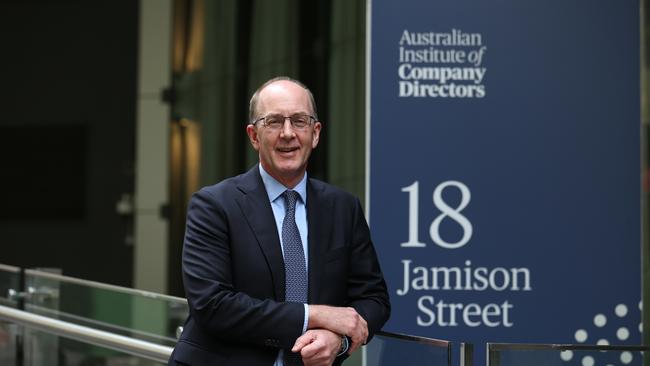Directors face hard decisions as survival of firms at stake: AICD’s Angus Armour
The next few weeks will be critical as directors assess whether their business can survive the crisis, Angus Armour, has warned.

The next four to eight weeks will be a critical time for company directors as they assess whether their business can survive the economic crisis, the head of the Australian Institute of Company Directors, Angus Armour, has warned.
While the federal government has given directors six months’ breathing room if they fear their companies may be trading while insolvent, Mr Armour said he expected many companies would need to make some hard decisions on their future in the next two months.
“The six-month window is good for companies who feel they can trade out for that time,” he said. “But there will be a group of companies which don’t have the cash flow and balance sheet to sustain them through that period.
“There will be businesses running on thin margins. If the crisis goes on for a long time they will struggle to recover and they will need to think about transitioning to the next stage.”
He said each company’s situation was different with those with good balance sheets and strong reserves best positioned to survive, but others with higher debt levels under more strain.
Mr Armour said he did not expect there would be a rush by companies to seek new loans despite easier credit arrangements from banks.
He said the government’s announcement that it would temporarily suspend the laws against trading while insolvent was a good thing, but directors still had to weigh up whether they should take on extra credit at this time.
“There wont be a rush to take up new credit until directors get more clarity around the extent of the economic situation,” he said.
“Boards are still having to make very difficult judgments about taking on new credit in the current circumstances.”
Mr Armour said business associations were in regular contact with the government regarding measures needed to handle the crisis. While there had already been a range of measures announced which would cushion the blow, there was “no silver bullet in these circumstances.”
“This shock has been significant,” he said. “In some cases, it may be fatal.
“In some cases companies are getting a tail wind from this such as in logistics where there is pressing demand for support.”
Directors were now having to decide whether the crisis was a temporary one or whether to make more long term, structural changes to their businesses.
“They are having to decide on what are the appropriate changes in dealing with customers and in the way they run their businesses.
“If the crisis is temporary, if so, for how long? Do they have reserves they can draw on?”
He said directors needed to be more aware of potential threats such as the increasing potential for cyber attacks while businesses were vulnerable.
“Cyber-attacks are on the increase,” he said. “People see a moment of weakness and they are exploiting it.
“Businesses need look at ways they need to survive these attacks.”
Mr Armour urged companies facing financial strains to start talking with their banks, suppliers and other creditors as early as possible about their circumstances.
“The most important thing is to communicate early and establish a conversation about what is needed to get things done,” he said.
“Company leaders need to cast the net pretty widely to include those in their supply chain and creditors and make sure they are all working off the same fact sheet.
“The longer you wait, the further back in the queue you are, and the harder you have to work to establish trust.”
Mr Armour said company directors were also having to deal with the issue of continuous disclosure in the current highly uncertain economic circumstances.
He said many were dealing with it by withdrawing profit guidance statements.



